Books of 2020
December 31, 2020
Another year, another batch of books.
In this post, I will once again be summarising and sharing my thoughts on the books I have read throughout the year. Please note that similar to last year’s rendition, this post will not be a collection of reviews; nor is the inclusion of a book necessarily a recommendation. Of course, if you would like to discuss a particular title, or have any recommendations, please feel free to reach out.
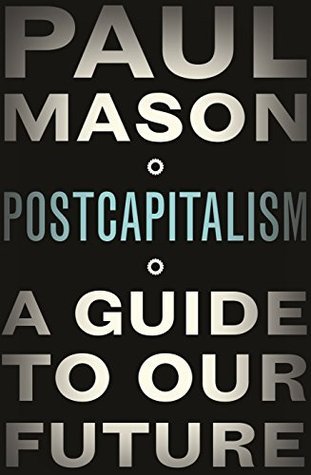
In Postcapitalism - A Guide to Our Future, British commentator and radio personality Paul Mason, discusses uncontrolled, free-moving markets and the enshrinement of the only way to prosperity as being that of relentless, egotistical pursuit. Indeed, the doctrine wherein the free market is but a medium through which self-interest is expressed and reflected: the doctrine of neoliberalism.
In arguing why capitalism has flourished the way it has for as long as it has, Mason identifies four key components: (1) The endless troves of fiat money allowing the developed world to be built on ever-increasing mountains of debt; (2) the relentless financialisation of our world fostering a reality in which a single mother on benefits forced into payday loans is worth more than someone with a steady, decent paying job; (3) the global imbalances and massive trade deficits provoking flammable environments of unsustainable debt contingent on continued high growth; and (4) the rise of information technology whose emergence mirrors a disappearing act and, paradoxically, in Mason’s view, is incompatible with a market economy as it denies markets the ability to create dynamism. Capitalism, Mason argues, has already started to crack and will, for all its inherent intricacies and perpetual adaptability, eventually crash and burn.
Invoking controversial Soviet economist, Nikolai D. Kondratiev, and soon Karl Marx himself, Mason introduces the reader to the disputed theory of economic waves and cycles. Seeking to identify what causes a crisis, Mason aptly refers to Marxism as both theory of history and theory of crises. However, spearheaded by brazen greed and American imperialism, modern finance has created a world which is hardly applicable to that which Marxism considers. Propelled by the Marshall Plan and American leadership, the (American) economy experienced tremendous growth during the 1950s and -60s. A stable international monetary system designed to reduce debts further meant that finance was curtailed.
However, when Nixon, in response to increasing inflation, ditched the gold standard in favour of free floating fiat currencies, the foundation for neoliberalism was firmly established. Yet, the subsequent emergence of neoliberalism was anything but given and could not have co-existed with an organised workforce. Accordingly, leaders like Reagan, Thatcher, and Pinochet attacked labour and busted unions. By 1979, workers had failed to adequately resist, and capitalist countries could deal with crises by lowering wages and low-value models for production, thereby removing the need to innovate to escape a crisis. This coupled with the rise of information technology underpins Mason’s argument for the impending demise of capitalism.
While Mason writes in an engaging—albeit at times exceedingly condensed manner—and makes several interesting (and occasionally compelling) arguments, his generalisations and consistent ambiguity leaves much to be desired. However, Mason is not seeking to provide answers; much less does he claim to have them. Instead, Matson wishes to provoke a serious discussion of the world we currently live in; where it is headed; and where we would like it, and ourselves, to end up. And this, Postcapitalism certainly achieves. 368 pages.
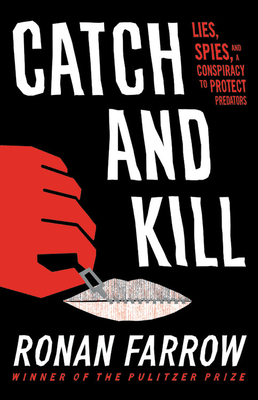
Above all, Catch and Kill by Ronan Farrow is a story of persistence and perseverance; about standing up, and keep standing, for what is right, even in the face of relentless resistance from a system designed and ruthlessly controlled by perpetrators. In pursuing justice, Ronan Farrow does not give up; the team at The New Yorker does not give in; and, most importantly, the courageous victims who have been silenced for far too long make their voices heard. In many ways, this is a contemporaneous account of what it takes to force justice through a system refuting the very existence of injustice. Yet, for all the struggles, Catch and Kill is likely only the tip of an enormous iceberg, all but guaranteeing equally horrendous stories will inevitably trickle out over the coming decades. However, perhaps Catch and Kill, and the subsequent sentencing of Harry Weinstein can pave the way for others. Keep up the good fight. 608 pages.
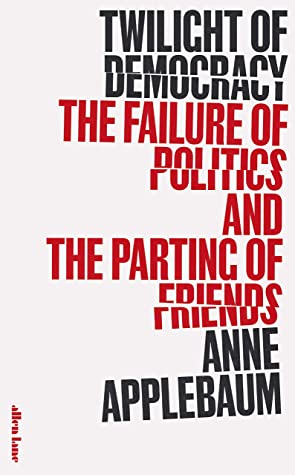
Twilight of Democracy by Anne Applebaum examines the global decline of democratic values fuelled by increasingly loud, right-wing politics. Using Poland, Hungary, the United Kingdom, and the United States as case studies, Applebaum identifies and outlines a number of catalytic events she considers central to the subsequent rise of fascism and authoritarianism. She further discusses why these and similar events are not necessarily unique, nor reserved to the specific countries in which they have occurred, thus underscoring the importance of paying close attention to political fringes.
A prime example of a country steadily sliding into fascism is her current country of residence, Poland: A narrow electoral victory in 2015 to the right-wing populist and national-conservative Law and Justice (Prawo i Sprawiedliwość, or PiS) fast paved the way to a wide range of anti-democratic laws and policy decisions. Indeed, almost immediately upon assuming power, PiS invented both visible and invisible enemies by neatly injecting conspiracy theories into the public discourse while simultaneously attacking the free press before blatantly installing hand-picked judges, promptly swinging the courts in their favour.
These events, and those which followed, transformed Poland into a terrifying example of how, given the right circumstances, both educated and affluent citizens can dramatically and fundamentally change their opinion and core beliefs. There is no reason to believe this can only happen in Poland, thus prompting the question: How?
At its core, Applebaum argues, authoritarianism appeals to people for whom complexity and discussions are uncomfortable and change is inherently suspicious. The notion of feeling as though you have been unfairly treated—perhaps cheated out of something otherwise felt deserved—is sufficient. A person need not be deeply ideologues nor heavily engaged in politics; they merely need to feel cheated.
A rigged and uncompetitive system sounds bad if you want to live in a society run by the talented. But if that is not your primary interest, what’s wrong with it? — Anna Applebaum on authoritarianism.
Across the Atlantic, in the cult of Trumpism, convincing oneself of America’s standing in the world is sufficient justification for seemingly any crime, misstep, and outcry. If something helps bring back perceived superiority of the past—if it makes America great again—it is not merely justifiable, it is necessary. Trump thus becomes a figurehead for those who desperately try to convince and reassure themselves of America’s, in their eyes, unbeatable standing. 224 pages.
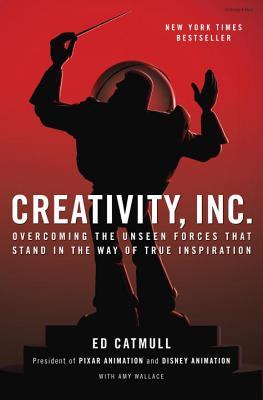
In Creativity Inc., Edwin ‘Ed’ Catmull, co-founder of Pixar Animation Studios, outlines hard-learned lessons on not only what it means to manage well, but what it means to do so from within a uniquely creative company such as Pixar and how diligently creating (and later safeguarding) the right culture is paramount to success.
As with most stories, Catmull starts at the very beginning. Indeed, before anything even resembling Pixar became a reality and knowing how to manage a necessity. He starts with a dream. A dream of creating the first computer-animated feature-length film. And while the book does indulge the reader with the intriguing history of Pixar, management remains the main character. This is particularly interesting as Catmull, who earned a Ph.D. pursuing his dream, is, by his own admission, an unlikely leader.
Yet, perhaps largely thanks to his improbable path and academic background, Catmull succeeded in creating a uniquely collaborative and open-minded environment akin to what he experienced during his studies and subsequent research. And while maintaining this environment became increasingly challenging as Pixar underwent immense commercial success—a challenge further exacerbated when Disney purchased Pixar in 2006—it has been central to Pixar’s success. In explaining what actually constitutes the success of Pixar, Catmull points to a number of mindset and leadership decisions:
An honest embracement of failure. Mistakes are inevitable, and so allowing teams to fail in the earlier stages of a project is thus both financially sound and presents an invaluable source of learning. A fear of failure, Catmull argues, fosters inflexibility by favouring carefully conceived, often rigid plans. This accomplishes exactly the opposite of what is generally necessary all while deterring creativity and innovation. Good management is thus not about avoiding risk and failure, but rather about embracing an iterative process and consistently positioning the company such that it can always get back on its feet.
The importance of assembling the perfect imperfect team. It is not just a matter of hiring the most talented people—though Catmull only hires those whom he feel are smarter than himself—but also about forging a team which can work seamlessly and effectively together. This means promoting diversity; both in the traditional sense of the word and in terms of ideas and perspectives.
Empowerment. It is not enough that individual teams are diverse and strong; the overall environment and ability to freely collaborate across teams is equally important. Teams must be entrusted and empowered to make decisions on their own. It thus falls on management to trust the people they hire. At Pixar, the creation of Braintrust, in which large groups of employees and film-production experts from various teams and fields review each film throughout its production, has been central. Anyone attending a Braintrust may give whichever comments or suggestions they want, but their advice is not mandatory.
Acknowledging confirmation bias when leading is essential to discovering what might just be better ideas or otherwise crucial information. Animators used to work throughout the entire production process, leading to endless deviations, frequent adaptions, and ultimately wasted work. Instead, by moving the actual animation towards the end of production—once the story, characters, and thus forth had largely been fleshed out—animators could work with a clear understanding, optimising their workflow whilst reducing expenses. The success of Braintrust is in many ways thanks to Pixar welcoming different perspectives, deterring confirmation bias.
And finally, in order for companies to operate at their best, they must, Catmull argues, actively strive towards a goal. This goal need not be something specific—Pixar has a passion for excellence, for instance—but is, nonetheless, instrumental in motivating employees. Similarly, companies will not perform well unless employees feel as though they are contributing directly to the company’s drive.
While several of Catmull’s hard-learned lessons seem like common sense, their application within an inherently creative company in a unique market all but underscores their importance. Additionally, while talk is cheap, the actual application is hard, and Catmull does not shy away from discussing the challenges and iterations necessary to get where Pixar is today. Interesting read! 368 pages.
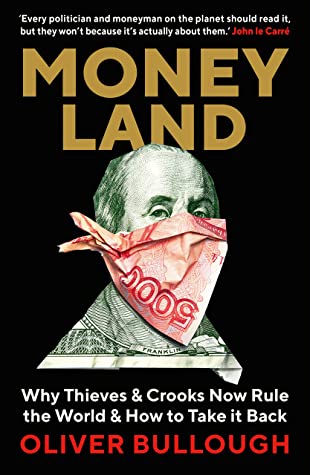
Moneyland by Oliver Bullough documents our world from the perspective of the greediest, most unscrupulous elite. In doing so, Bullough also underscores the growing dangers of allowing the current financial system to continue its reign unchallenged. First, however, Bullough attempts to explain how we got to where we are today.
In the decades leading up to the Second World War, sprawling global finance found itself largely unregulated. This allowed capital to move rapidly between nations without regard to any currency destabilisation, poverty, or social unrest left in its wake. As these were all contributing factors to the war, Allied powers agreed to reign in global finance by (a) tying the value of national currencies to the United States dollar (which in turn, at the time, was pegged to gold reserves); and (b) strictly limiting overseas transactions to long-term investments.
These efforts worked for a while, but loopholes were fast found and even faster exploited. Indeed, with the United States government unable to control dollars already stored overseas, London bankers invented eurodollars which soon flowed between countries just as the actual dollar had done. Other creative financial innovations such as tax-free eurobonds followed, all but ushering in a new, even more aggressive market. A market in which money (and financial creativity) only became increasingly fungible and global soon emerged.
Ultimately, this market gave birth to a new country: Moneyland.
Moneyland is the secret country of the lawless, stateless super-rich who directly benefit from actively abusing the system they conveniently help design. This is the transient land of offshore tax-havens like Nevis (whose laws were written entirely by American lawyers and consultants, drawing inspiration from Delaware) and Jersey; the land of corrupt rulers enriching themselves in some of the world’s poorest places like Angola; and the land where assassinations and poisoning of those daring to speak out against kleptocrats is commonplace.
“If you squash one ant, or arrest one crooked lawyer, the activities of the rest will continue unaffected. It is the whole system that must be changed, and this is hard.” – Oliver Bullough on the fundamental challenge of reigning in global finance.
Worse yet, Bullough argues, by leaving whole, actual countries unable to tax their wealthiest residents, forcing those least able to afford it to support the government, Moneyland threatens to take down the entire democratic world. Indeed, the current, effectively unregulated state of affairs parallels what helped provoke the Second World War in the first place. However, this time, because the system is designed by the very people abusing it, nothing short of a fundamental overhaul is going to change anything. 304 pages.

In Doing Justice, Preet Bharara, who rose to international prominence as the sole federal prosecutor refusing to resign under Donald Trump’s presidency, introduces the reader to the American justice system. A system that, for all its flaws and shortcomings, Bharara thoroughly believes in. Democracy, after all, can only exist and flourish in a society that respects the rule of law.
The pursuit of justice is often a thankless and unrelenting job, but one which Bharara finds deeply rewarding. At its core, pursuing justice is about discovering the truth and holding someone accountable.
The pursuit begins with the inquiry phase during which an investigator must commit themselves to the truth. That means actively letting go of biases and presumptions about guilt and innocence while putting in the hours to meticulously examine a case from every possible angle. Importantly, committing to the truth also means being willing to reconsider evidence, admitting mistakes, and accepting different perspectives. Bharara draws on his extensive experience and provides several anecdotes acutely accentuating these points.
As a case advances, obtaining cooperative witnesses typically becomes paramount. This, however, is easier said than done and requires the ability to delicately and respectfully asking the right questions to the right people. Notably, Bharara also stresses the importance of asking questions internally about the investigative process itself. Indeed, just because a process has always been followed does not necessarily mean it is the right nor the most efficient one for a given case.
As the inquiry phase draws to an end, evidence will either support an exoneration or suggest that someone should be charged with a crime. This leads to the second phase of an investigation: Accusation. This phase is also the point-of-no-return as accusations, whether right or wrong, change lives. They must, Bharara stresses, be made in the name of justice and not under pressure.
The next phase is judgement. During this phase, commitment to truth and justice must be maintained – regardless of how it may impact chances of winning in court. However, the last thing a prosecutor wants to encounter in court is a surprise. And so, preparing for both an acquittal and a guilty verdict is central to arguing successful cases.
In the event of a guilty verdict, the final phase is punishment. It is also the one phase that is often out of the prosecutor’s hands. Outside recommending a certain punishment, the final decision is made by the judge and should be “sufficient but not greater than necessary”. A hard, but pertinent, balance to strike. 368 pages.

The Uninhabitable Earth: Life After Warming by David Wallace-Wells is an uncompromising book about climate change. We know it is bad. We know what is happening. Wallace-Wells, however, makes it painfully apparent that what we have seen thus far is but a teaser: It will get worse, and even worse than we dare to fear.
Wallace-Wells pulls no punches, does attempt to obfuscate or downplay the seriousness of climate change, nor does he devote much, if any, time to reassuring and optimistic what-if’s and maybe’s typically present in books on this topic. Additionally, it is not a book about the underlying science, but a book about what warming means to the way we live on this planet. It is a depressing, but necessary, story of our future.
It is a report about what we already know and expect like food and water shortages followed by unprecedented refugee emergencies. It is also a report about what few of us know and much less except: How climate change will profoundly transform our politics, our cultures and societies, our relationship to technology, and our sense of history. And, as should be obvious, not for the better. In short, climate change will ruthlessly usher in a new era which will distort virtually every aspect of the human life as it is lived today.
Above all, the message Wallace-Wells seeks to convey is that we are no longer standing at the edge of this terrifying future. We have knowingly crossed the edge and are already falling into the depths of irreversible change and unimaginable consequences. Our actions in the coming decades—indeed, the coming years—are going to determine our landing and whether we can feasibly deal with it or not. Avoidance is no longer an option. Recovery might also not be an option. 310 pages.
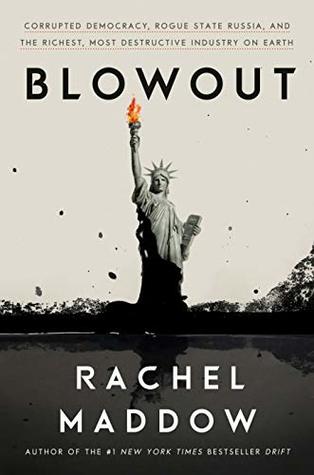
In Blowout, Rachel Maddow draws a dripping line of corruption between the oil and gas industry and the Russian interference in the 2016 United States elections. Starting with Vladimir Putin opening a Russian gas station in Manhattan in 2003, Maddow takes the reader around the world and lays bare the unimaginably greed and inherent anti-democratic values underpinning the industry.
It should come as no surprise that the industry is dirty. What might come as a surprise, however, is the degree to which governments and officials around the world actively work to enable it. A good example is 1969’s Project Rulison during which a 40-kiloton nuclear bomb given by the US Government was detonated approximately 2600 meters below the Rocky Mountains in Colorado. The goal was to release natural gas, and while natural gas was released, it also turned radioactive. The cleanup was only completed in 1998. Other sites remain contaminated.
Another example is that which followed nuclear bombs: Fracking. Invented by George Mitchell, fracking involves the high-pressure injection of slickwater (a chemical cocktail of water, sand or other proppants suspended with thickening agents) to create fissures in deep-rock formations, enabling natural gas, petroleum, and brine to flow. However, much like nuclear bombs, immense environmental harm and contamination is being caused by fracking. Including, but not limited to, illnesses, man-made earthquakes, and the deaths of pets and livestock.
What might also come as a surprise is the fairly small amount of people ultimately calling the shots. This includes, among others, ExxonMobil CEO and Secretary of State Rex Tillerson and exiled Russian oligarch Mikhail Khodorkovsky. Considering the immense harm caused by a fairly small group of people in pursuit of even greater profits, Blowout is a sobering reminder that the oil and gas industry remains as unregulated and, paradoxically, subsidised as ever. And this is fundamentally at odds with demoracy. Indeed, as Maddow’s concludes: Democracy either wins this one or disappears. It oughtta be a blowout. 405 pages.

In Novacene: The Coming Age of Hyperintelligence, James Lovelock builds upon his Gaia hypothesis which posits that Earth, with all its living and non-living components, operates as a self-regulating system with the sole objective of maintaining a habitable and stable environment. At the core of this hypothesis is sunlight. Lovelock defines the central role of sunlight in the progress of evolution as (1) sunlight’s energy being converted into the chemical energy necessary for life; (2) sunlight’s energy being converted into physical energy using coal or fossil fuels; and, finally, (3) sunlight’s energy being converted into information via computers and their ability to control electrons.
Lovelock then discusses Anthropocence, the proposed geological epoch which began when human activity started to impact Earth’s ecosystems and geological processes. Starting earnestly in 1712 with the invention of the Newcomen atmospheric engine, a catalyst for the subsequent Industrial Revolution, and continuing to today’s world dominated by economic incentives fuelling climate change. It is at this stage that Lovelock introcues the reader to what he believes comes next: the Novacene era. As we are making the Earth’s environment increasingly hostile to life, we must adapt in order to survive. Key to this necessary adaptation is the development of a new kind of intelligence that will surpass human intelligence: hyperintelligence.
Hyperintelligence, Lovelock argues, will be achieved through the development of artificial intelligence that is capable of learning and adapting at an unprecedented rate. Lovelock’s hyperintelligence is similar, if not equivalent, to the concept of a singularity or an AGI. Regardless of terminology, Lovelock concludes that such development will foster a new era of technological advancement. An era in which machines will solve problems and make decisions that were once the sole domain of humans. The consequences of this development are far-reaching for both human society and the planet as a whole; indeed, we may even need to redefine what it means to be human. However, Lovelock makes the argument that any hyperintelligence will need organic life to keep the planet from overheating, thereby finding incentive to keep humanity alive. Who knows, humans might just be happier under a benevolent, eco-friendly artificial superintelligence. 160 pages.
